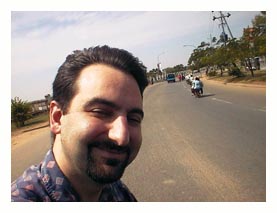
Coming back for more
In the New Cambodia?
Jump to:A day in the country
A night in the city
An attempt to remember
It's time to go
February 2000
Within a couple of hours of arriving, I found myself zooming down Monivong Boulevard on a motorbike, dodging bicycles, cyclos, motos and pushcarts, and trying to get out of the path of pushy white Camrys driven by self-important minor figures in Cambodian's exploiting class. (This is a world of interlocking circles--the bike I was on was lent to Eric by Chris Fontaine, who had used a bike of mine while I was away from September 1997 to January 1998. Don't worry, not all of the circles are about motorbikes.)I stopped by Francois' garage to see if I could reclaim my old Yamaha, the same one Patrice and I rode down to Kampot in 1995. It seems like Francois has pretty much laid claim to it at this point, which is fair enough as he's probably put more repairs in than it's worth. The bike was there, but Francois wasn't, so said my hellos to the mechanics and headed to the house on Street 466 where I lived for most of 1998.
The gate was unlocked and I went in. Sarah and Glenn appeared on the steps and Beth came up behind them in the doorway. Wales, my feline herald, lurked inside the house. Our dingy but valiant Renault 12, the Spank mobile, was poised athletically beside me in the driveway. I was pushing a motorbike in rather than out, but otherwise the moment that I left, almost exactly a year earlier, had recreated itself. The crowds of people I know are thinning rapidly--Joe and Beth, for example, are both moving to Jakarta this week, for DPA and the UN respectively. But most of them I feel I have little to say to, as if I said everything necessary last year. Conversations are stuck in their old too-familiar patterns--it will be interesting to see some of the same people outside Cambodia, at Rob and Rachel's wedding in June. Maybe a change of context will help add variety to the palaver. I don't mind being back here in order to work on this project, but other than that I didn't have a reason to come.
It's just more of what I had my fill of already, but with more traffic, more corruption, more tourists. Cosmetic improvements to the Westerner-friendly parts of the city, like repaved streets with stripes for decorative purposes only and the flags of all nations marring the view across the river, convincing the foreigners that Hun Sen isn't so bad (forget about the killings, of course, as long as they don't happen in front of us). No sign of the rule of law, but who cares, as long as the Foreign Correspondents Club is doing good business?
And the Daily is full of new people. Some are good writers but they don't have the historical perspective to make sense of the stories. Some of the stories read as if they were about Westchester County. As predicted I am looking forward to being back in New York, where at least the news from Westchester actually comes from there.
Stopping for a bite at another riverfront restaurant, it became clear that some things had not changed. On the menu, we found items that you wouldn't expect in New York...

Amusing news item of the week: Hun Sen took a helicopter load of journos out to the western provinces to show off the burning of a marijuana field (for the benefit of DEA types). The soldiers chopped down and burned a little corner of the vast field, while the journos stuffed their backpacks with weed. One guy was said to have carried a Christmas tree of a pot plant back over his shoulder. Now that's journalistic dedication for you!
A day in the countryside
The North Star is buried on the horizon beyond the distant dark line of trees that edge a vast plain of rice fields, on the powder-mud bank of a long canal that leads from the provincial town of Takeo to the ruined 8th-century temple at Phnom Da. The rice fields are brilliantly green in daylight, invisible at night. The lights of Takeo glow feebly in the distance, but they are miles away. Our speed-boat drivers are negotiating with a boat-dwelling couple who were rash enough to string their net all the way across the channel on a moonless night.My friendBeth and I drove to Takeo early this afternoon, bumping down Route 2 in a wheezing, chocolate-brown diesel Mercedes of early 1980s Communist-era vintage, loaned by her mechanic after the chassis of the old Renault disintegrated. A southern province of rich rice paddies, which straddles a major smuggling route with Vietnam, only a few dozen kilometers away by water, Takeo should be able to maintain a bustling capital.
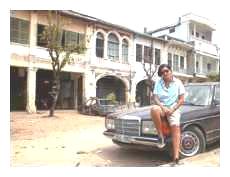
But the curse of the past is Takeo's present. It looks as if the US bombing 30 years ago took place in the last few months. Most commercial activity takes place along a single pitted road lined with lean-tos and concrete box buildings, while the central market square is a squalid, depressing ghost town--a hideous Soviet-style market building encircled by dirt, surrounded by the sad shells of colonial era shopfronts.
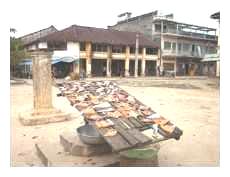
On the decaying front of one of the few operational shops, a photo store, the faded word "BOULANGERIE" whispers from better years--better for this town at least. The street in front of the market is occluded by a pond of greenish-gray muck, stagnant but for the sloshing feet of a line of half-clothed children. Even the bits of litter that are strewn across the ground of the square are old and worn. The most color to be seen is the pink flesh of fish, drying in hunks on a wooden rack where the town's central monument must once have stood.
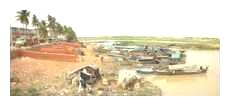
We looked around for a street that wasn't blocked by heaps of garbage or moguls too big for the old Mercedes to handle, eventually finding a roundabout way to the port, which is a dirt road above a tiny harbor. Men in round Vietnamese hats were unloading terracotta roofing tiles from a series of battered wooden riverboats, bent forward, carrying stacks of tiles on their backs up a beach of rubble, lifting them up to other men loading the trucks.
Amid the riverboats were a few small, open speedboats. Their operators surrounded us with offers of "o-bua, o-bua", which is what's left of the word "outboard" after a trip from English through French to Khmer. This is the dry season, and business must be slow; the road to Phnom Da was well above water, running through the rice fields parallel to the canal. Both led due east, straight as arrows to the horizon and Vietnam not far beyond.
The last time I was visited the old temple was in the rainy season of 1996, and the fields were submerged as they are each year. Takeo was a peninsula, Phnom Da was a distant island, and the price of a boat there was twice as much. Now the offers started at $20, and fell to $15. As we boarded our choice, the offers from losing bidders dropped to $10, but they had missed their chance.
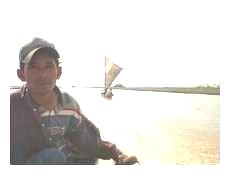
For the first 10 or 15 kilometers, the canal was an aquatic interstate. Smooth and straight, with views only to the front and back. To the sides, dikes rose above eye level, keeping the water from flooding the paddies. The monotony was broken here and there by smaller channels and by portable engines sitting in the mud, chugging water up through pipes over the dike. Slender wooden boats plied the banks, poled along by the inhabitants of the occasional huts that stood above on the crest of the berms to each side. Little groups of heads bobbed in the water, people bathing, fishing, clearing weeds, adjusting irrigation sluices. Arms reached up, waving as we sped past. A sailboat, the only one I've ever seen used in Cambodia, aside from a couple of battered sailboards they rent to foreigners down in Sihanoukville.
The channel swerved in broad arcs and the pilot swerved confidently with them as Phnom Da, a small hill topped by the crumbling temple, rose into view a few kilometers ahead. Fishing boats were tucked in the corners, small villages accumulated around house-sized bamboo and reed weirs in which fish are caged for live storage after being caught.
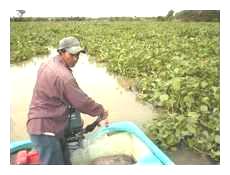
Turning off the main channel, we passed the town of Angkor Borei, built over relics of the pre-Khmer sixth-century civilization of Funan, and passed under Angkor Borei's tall plank bridge. Turning once more we faced a screen of bamboo built across the mouth of a side channel.
Our boat threaded through a narrow opening, riding over and pressing down a bar that I realized was the top edge of a fish-gate. Cement counterweights overhead lifted the bar back to the water's surface after our boat passed, preventing any fish with itchy feet from leaving town by any means other than a net. and continued as the channel widened. Here there were dense colonies of riverweed through which passing boats picked and pushed their way. The stalks were thick, supporting broad spade-shaped leaves. The pilot nosed the boat through, wagging the straining outboard back and forth to free its blades from the tangle.
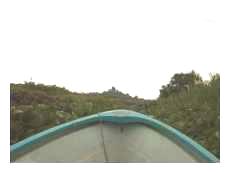
The channel narrowed again and the weeds thickened, but Phnom Da was just ahead. Behind us, the thin clear path we had carved slowly closed up, leaving an unbroken sea of green leaves reaching once more toward the sun.
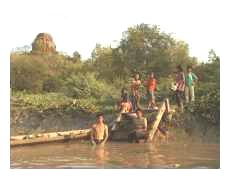
The boat nosed up to a small stairway in a harbor dug from the mud at the foot of the hill, interrupting some villagers who tried gamely but, as it turned out, in vain to extort small sums of money from us for an unknown and undetectable service.
After a short, sweaty climb we stood atop the hill, where legend has it a local girl was wooed by the naga, the magical snake of Hindu mythology, in the shape of a prince. The air was still, and filled with the thrumming of insects and the chirping of birds wheeling above the rice fields and fluttering through the underbrush. The reddish sandstone temple stood silent, its roof partly collapsed, topped with brambles that looked like hair standing on end. Inside, the cool air was spiced by a few sticks of burning incense. The canal we had negotiated could been slicing through the paddies below.
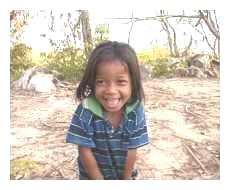
We hiked to a second, smaller temple and then returned to the boat, followed by a group of chattering kids who sang songs as they marched and joked charmingly among themselves about the location of my wallet and the quantities of money they surmised it held.
Within a few hundred meters of the temple, we ran into the weeds again. Somehow, they had become thicker. The engine thrashed among the stalks and underwater roots. Huge, thick rafts of weeds jammed themselves under the boat. The engine strained as the boat dragged small islands of them along with it. The pilot backed up, pivoted, drove forward, trying to clear them. What happened to the channel we had carved only an hour or two before? The canal seemed entirely blocked.
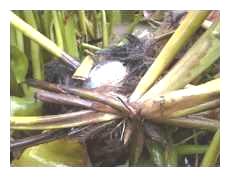
Suddenly smoke billowed from the outboard. The pilot was cursing. He stripped down to his blue briefs and jumped in, first trying to pull the weeds away from the front of the boat, then trying to push the boat through. Pulling weeds away from the side of the boat, I found a fish ensnared in their roots. It appeared they were carnivorous!
I took off my sandals and put my wallet in my backpack, rather looking forward to taking my chances with the flesh-eating weeds and getting out of the intense sun. As I stepped on the steep bank my foot slid around in the slime. My untrained toes could find no purchase.
"Mister, mister", the boatman protested, motioning me back into the boat. He soon enlisted a farmer to help pull the boat slowly through the weeds.
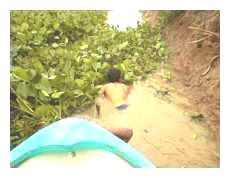
Progress was painfully slow. Our boatman and the farmer hauled the boat between huge matted islands of vegetation, pushing it one aside even as another swung in toward us, scraping along the edges of the boat, reaching tendrils over the gunwales. As the sun reddened we passed families of perplexed fishers who stretched their nets through the water and primed diesel generators for the task of electrocuting their catch en masse.
The canal finally started to clear, and the farmer collected a fee of 1000 riel--about 30 cents--and we puttered on under the diminished power of the wheezing outboard, which coughed blue smoke. The fishgate, however, was hopelessly jammed, and the water was too deep for hauling. Our boatman climbed out, up the bank, and disappeared. At the top of the bank a group of children appeared, and edged closer for a better look at these two barangs sitting in boat, watching the sun set over the distant Phnom Da.
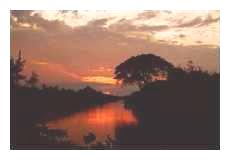
A few adults went out their business, crossing the river by walking above the water on a set of single poles lashed to thin pilings. We started to wonder if our boatman had simply borrowed a motorbike and gone home. Meanwhile we couldn't get much more out of the kids than nervous smiles, giggles and lackadaisical requests for "som loy" (money please). Those musical calls of "hel-lo" seem to have lost their popularity over the last few years, replaced by a plea for a handout.
The sun was gone when he returned, along with a man who owned a motorized longboat, which dragged us with difficulty over the fishgate. When another speedboat passed in the opposite direction our boatman frantically hailed him. I couldn't tell if it was a warning or a request for help, but the second boat turned and the two discussed a deal. I was amused to catch the second man asking the first if we spoke Khmer, and imagined that our deal improved when he was told that we did. Soon our two boats, tied together arrived at Angkor Borei, where the muddy beach was filled with wooden vessels of all description, many with families bedded down inside or eating dinner on deck.
After a short stop, negotiation of an extra $5 for the second boatman to take us all back to Takeo and a quick purchase of provisions by the first boatman we were on our way, skimming across the glassy smooth surface under the windless night sky.
The provisions, it turned out, were beers, and they were produced in short order. One hand holding a cool beer and the other tracing a line in the hot river water is a fine way to travel. Up ahead, lights bobbed at each side of the river. A sudden inkling of danger was confirmed by a sharp jerk and sudden, elastic deceleration.
We had hit the net. Shouts of rage emanated from the dark shape of a small houseboat that turned out to be the source of one of the lights. Across the river was the wife, with the other end of the net and the other light. The blades of the motor were knotted in a thick white wreath of nylon net, and we drifted to the bank, our boatmen exchanging remonstrations with the fishers. And we stepped out onto the bank and waited. And that's where you came in.
A night in the city
Back in Phnom Penh a few nights later, a different other world. Dinner at Casablanca, the Moroccan/Lebanese restaurant, now under new management that has taken over from the guy that I once was considering buying a purple VW bug with a homemade sunroof from. Despite the change in management they still have the big Alsatian dog that plays hockey.
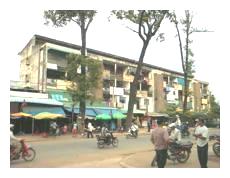
A stop at the beer garden of a hotel owned by Meng Sreng, a son of one Hun Sen's bankroller Teng Bun Ma. His "bodyguards" are housed across the street in a set of dilapidated Russian-style apartments. From this base they have carried out many of the worst terror projects going here: threats, kidnappings, murders, of everyone from people who have defaulted on debts to political opponents. Members who disobey their orders are killed. Those who obey their orders are often killed too. Men are a talking kind of meat, after all.
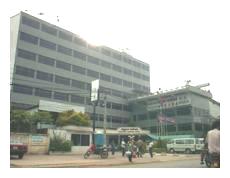
We sit in the beer garden, watching thugs swill cognac and drop thick arms around their stick-thin 14-year-old girlfriends, who flirt and totter on platform shoes. At the nightclub entrance Cambodian patrons are patted down; I am ignored.
Inside, on the stage where my band Spank played a year and a half ago, a Thai band fronted by an emaciated but ultra-professional lead singer with girlish moves and hard, adult eyes builds a wall of disco. Behind them on a huge screen, black-and-white American gangsters in speedboats enjoy a flickering 1940s shoot-out. Tables are populated by little groups along classic lines: usually two or three taxi-girls, a couple of hangers-on and one heavy guy who sprawls smiling and confident behind an array of empty Angkor beers or a bottle of whiskey. This is one of those places where the real heavies buy $275 bottles of Johnnie Walker Blue and leave them half-drunk at the table.
Fending off a couple of taxi-girls (a pleasant but vacant smile and glance away does the trick),we thread our way out for a stop at a new bar whose name is a combination of French and Khmer. Motor-bike taxis fill the street in front of the bar, which is, as I understand, operated by a team made up of a West African sports adviser to the Ministry of Youth, Education and Sport, and a tiny, tough ex--well, presumably ex--taxi-girl who used to go out on a long-term contracts with foreign men. Now she has gone into a business with a better future.
There is no one here that I know, aside from Eric who I came with, as it seems most of the few friends of mine who are still here have gone so far as to have produced babies or at least gotten responsible about their jobs. Luckily, Alejandra, the Cuban singer at Le Royal Hotel shows up, alternately pointing out visiting Cuban emissaries and her impressive collection of scabbed abrasions from yesterday, when the moto-taxi she was riding ran one of Phnom Penh's few red lights, was broadsided and landed on top of her.
OK, now it's late enough for me and I head home, and park my the bike that I sold off a year ago and have borrowed back in front of the FCCC, where a collection of moto-taxi drivers that I know will more or less keep it from getting stolen during the periods when they are not driving it up and down the street in front of my house at 2:00 a.m. They are aware that any remotely key-shaped object can start my bike up (they've known this about my bike for years) but they are totally unaware that every time they pass I can tell by the distinctive sound of nails rattling in a blender that it is my bike that they are vainly trying to force into a wheelie--something it probably lost the ability to do about ten years ago. Sometimes I go out on the balcony and watch them, relishing the irony that they have no idea that they are caught. But I don't really mind as long as they don't crash it.
So I park, say hello to Dara who wants to move up from his moto and go into business as a car-taxi. He's found a government office that will lend him $1500 to buy a car, and only charge 20% interest for a year. What a deal! Especially since he only has to put up the deed to his sister's land as collateral. If he misses a payment, all that will happen is some government official will seize his sister's land. I had not known the government was officially operating a loan shark business.
The alley that leads to my apartment, just five feet wide at the entrance, widens out into what in Italy would be a tiny piazza. Under a partial roof there is a wooden bed platform which has evolved over the last month into a thriving gambling den. A dozen players, male and female, old and young, throw cards and worn-out bills around the table, too fast for me to figure out the game, despite the urging of one of the moto-drivers who is so drunk on palm wine that he confesses to losing fifteen dollars there--a shocking amount. Cyclos are parked in the little alley, and he goes around waking up the sleeping cyclo-pedalers with pointless jabbering in half-English. They are surprisingly tolerant, but I suppose your expectations of comfort are low if you sleep every night outside in a cyclo.
So are the days and nights in Cambodia.
March 31, 2000
So here we are in Cambodia, Eric and I, writing this book which is intended to show the color and give the feeling of this place, and both of us looking forward to being somewhere else. This is an example of why.The first part we are working on--what we intend to sell as an article--is about the grenade attack on an opposition rally three years ago, the one that killed at least 15 people in front of the National Assembly. I've been writing their stories, how they got there, how some tried to save each other--soldiers told them they could not, or they would be shot dead. How they died waiting for the ambulances, and how everybody here knows exactly who must have ordered it, only they are too frightened to say it (almost all Cambodians) or paid not to say it (almost all expats), because of course it is the prime minister himself, Hun Sen.
Yesterday was the third anniversary of this massacre, and still no one has been arrested. The government's investigation has produced nothing at all, which is natural because they themselves committed the crime, and neither has the FBI's, which is shameful because they know as well, but to name Hun Sen would undermine the policy of hypocrisy and convenience that helped kill the people at that rally.
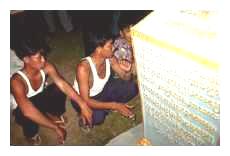
On the night before the anniversary service the opposition party put up a small stupa, which is a memorial monument, at the exact spot where the third grenade killed almost everyone who was standing near a sugarcane vendor's cart. The stupa is made of concrete and inscribed with the names of the victims in gold.
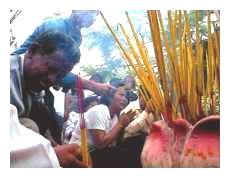
Of course the mayor, Chea Sophara, who is a close associate of Hun Sen, denied them permission to put it up, but he did agree to leave it there for the morning ceremony at the site, where the parents of the dead cried for their children as they lit incense around the stupa.
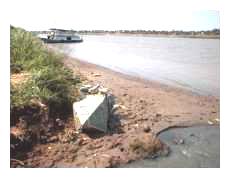
Last night the police came and knocked the stupa down, and carried it off to the riverside. Right in front of the main Buddhist temple they dumped it in the mud at the edge of the water where all can see, at the edge of the stream of raw sewage that pours black into the river.
The police could have removed the stupa and just disappeared it, but that would not have shown enough contempt. It seems they know the people already hate them, so their only choice is the show the people that there is no bottom to their evil. Meanwhile the mayor says he doesn't know who put it there, and the police chief says that police only provided security for whoever did it. Similar to the grenade attack itself.
And there the stupa sits, in the mud, with three policemen stationed on the bank above, with the stinking miasma of sewage all around it, with the names of the brave dead in gold letters now chipped and dirtied, reminding all who pass that the people who run this country, led by Hun Sen, say that if you die for freedom they will even shit on your memory.
|
Read a BBC story from June 13, 2000, about a police attack on mourners. |
It's time to go
Now it's been almost two months and just about every day here feels like one more too many. I really don't need to be here for any reason other than that's it's necessary for the project, even though it's been nice to see some old friends. Several of them have hit the road just since I got back; Indonesia and East Timor being particularly popular places to go.I notice that people I know here are increasing integrated with the legit international aid scene, which you can read as mostly illegitimate. It's like a little community of people who learn to hop from crisis to crisis like fleas hopping from dog to dog. Naturally, they suck a bit of blood out as they go. I just hope my friends are better than average, but if they are it's only because that's who I tended to choose.
One lesson, however, is never to underestimate the corrupting power of money, comfort and an exaggerated sense of one's own importance. The journalists seem more resistant as a class, being trained to be skeptical, whereas the NGO and UN types are rewarded for being complacent and gullible. The latest example I know of is a guy named Jeff here, who is the head of the UN AIDS program. He arrived with his squeeze, Dindo, a hyperactive TV aerobics instructor from the Philippines, whose only job seems to be to go to parties and discotheques.
They live in a French colonial villa in the center of town and it's packed with Ming vases, expensive antique furniture and other trinkets presumably collected during stints in various Asian playgrounds. In the garden is a small swimming pool (in-ground) and they have taken the trouble to install an aviary and stock it with rare and colorful tropical birds.
Meanwhile, more and more people are dying of AIDS every day here. They lie on straw mats on dirt floors of shacks all over Cambodia, with no medical care and no medicine. And I hear that the house of the director of the World Health Organization makes Jeff's house look modest. Ugh. Enough of this.
Here's the view from the balcony of the apartment Eric and I rented while we write. They would stick that US flag right in front of our window!
Want more pictures? See Mardi Gras 2000 immortalized.
Cambodia pages on this site
collected Cambodia photos on this site (in progress)
My notes from 1995-97 and from 1998-99 in Cambodia
a FAQ on working at The Cambodia Daily
a wide variety of articles on Cambodia I've written or co-written, mostly for The Cambodia Daily
articles on Cambodia and the Internet
a page about the 1998 elections ( in progress), with a collection of Sam Rainsy Party documents
Cambodian Personalities on Parade -- a short parade at this point
My page of Cambodia travel tips
Patrice visits Cambodia, a travelogue from 1996
Other related pages on this site
For other travel information, visit the Camera Obscura.To explore other parts of the site, go to the main entrance.
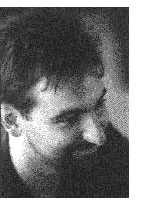 go to top of this page
go to top of this page